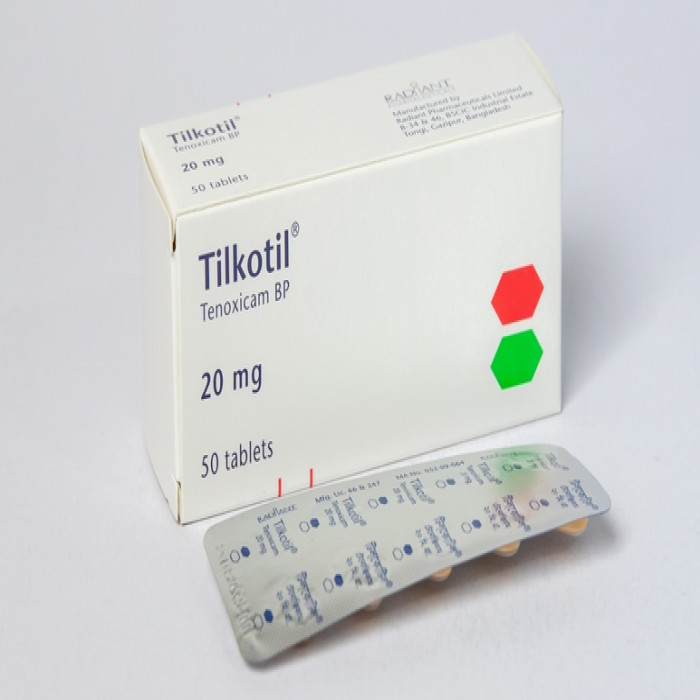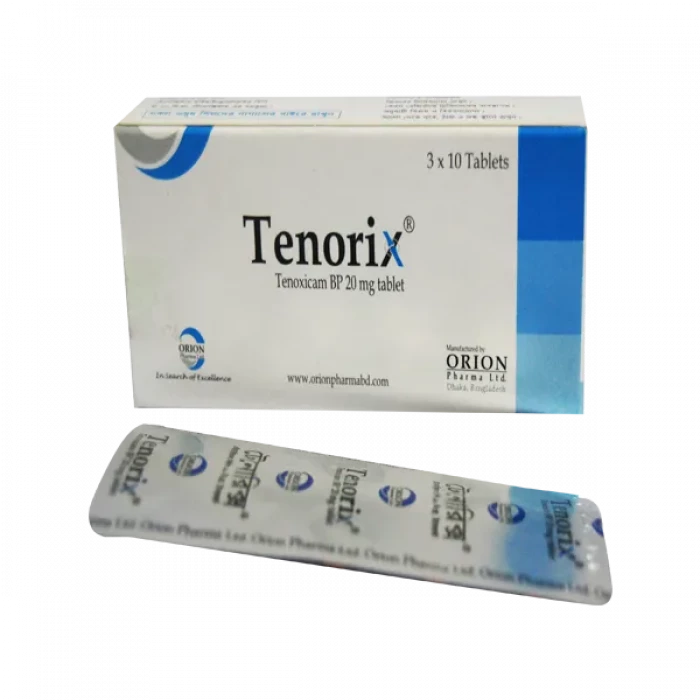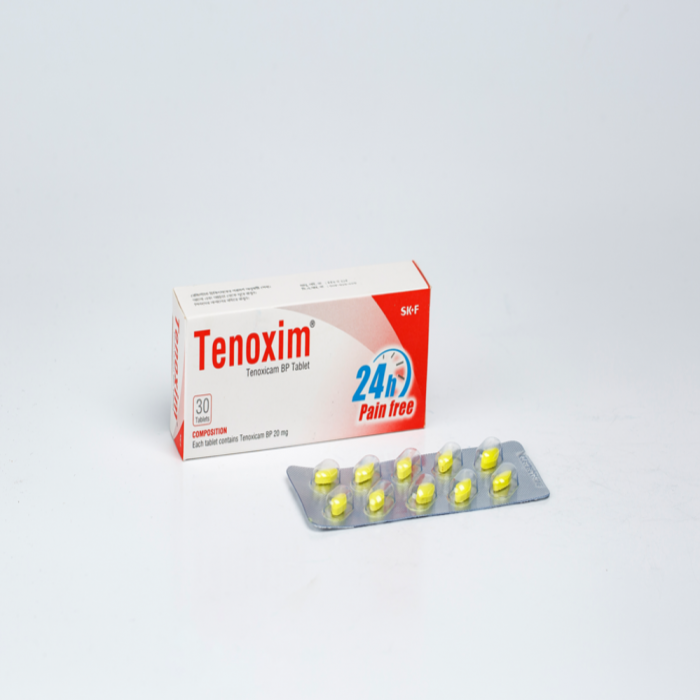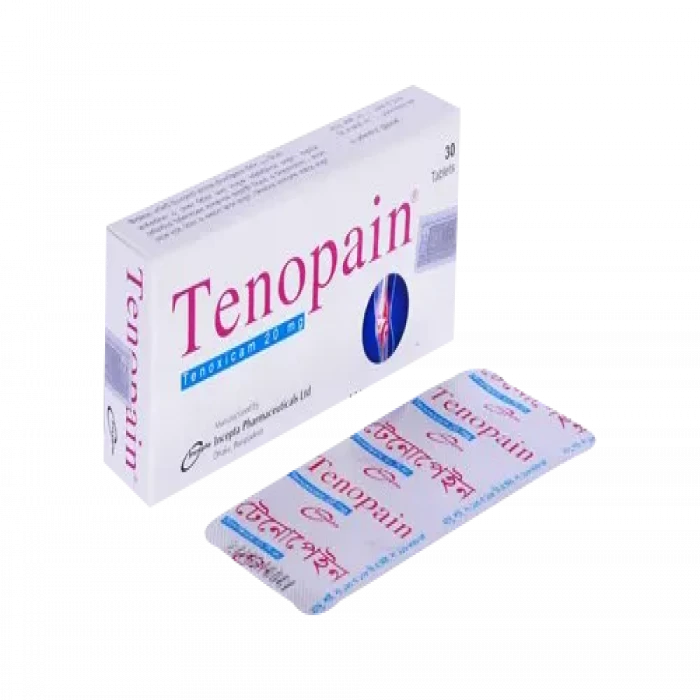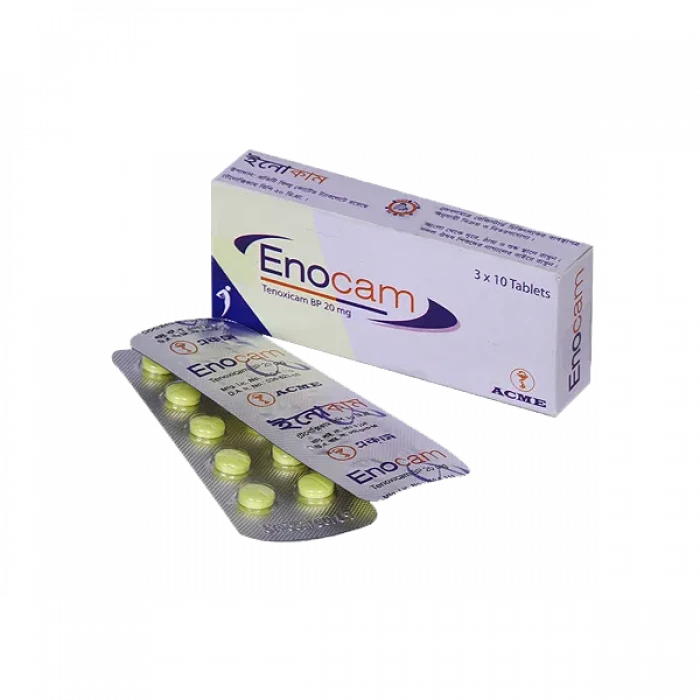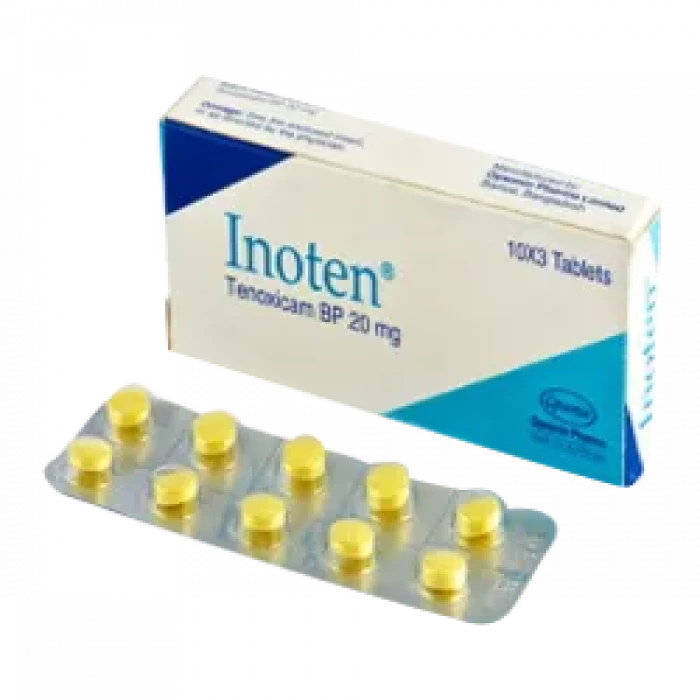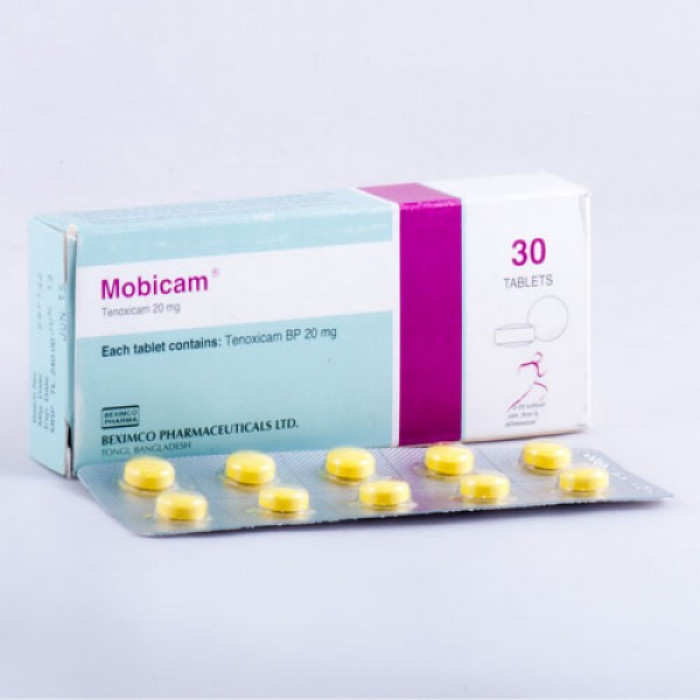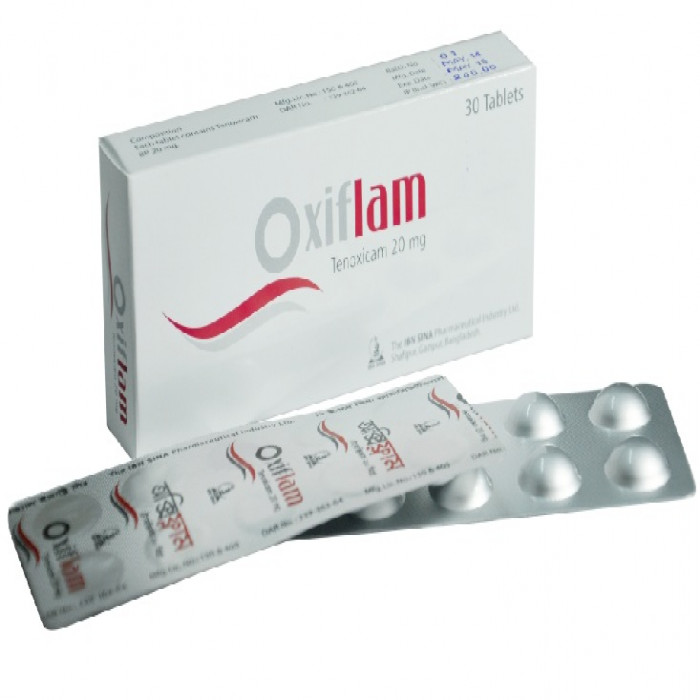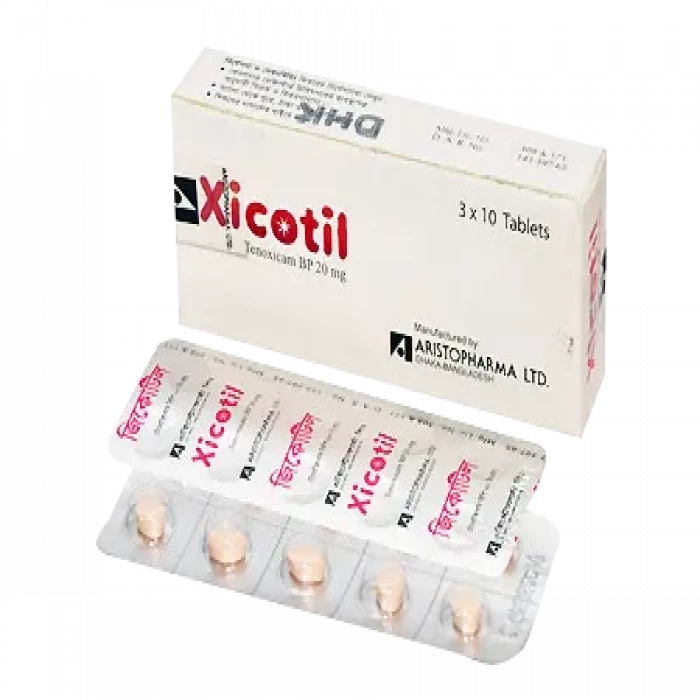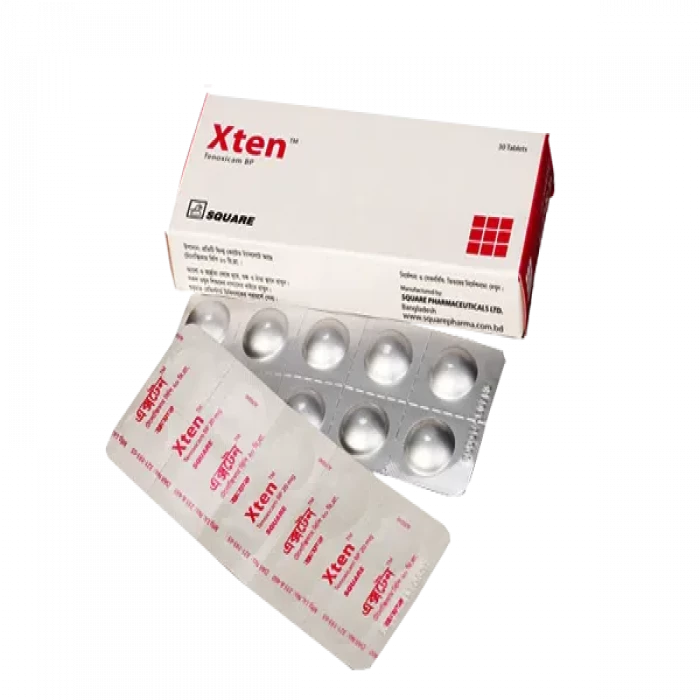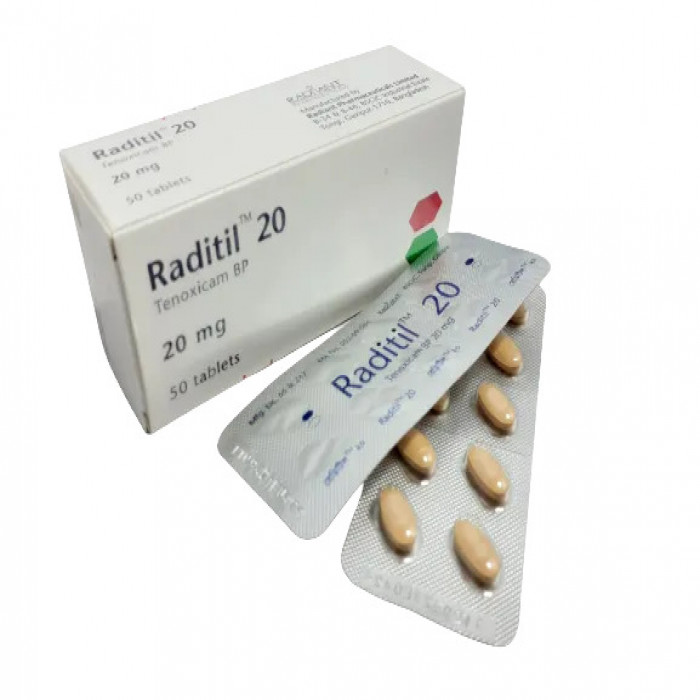
✔ 100% Authentic Product
👁️ Currently Viewing 5419
Tenoxicam is used to reduce pain, swelling, joint stiffness, and other symptoms of rheumatoid arthritis, osteoarthritis, and other inflammatory conditions.
Discount
Price: ৳ 171
MRP:
৳
180
5%
Off

100% Genuine Products, Guaranteed

Safe & Secure Payments, Always

Fast, Secure & Efficient Delivery

Proper Packaging
 Cash on Delivery - All over Bangladesh
Cash on Delivery - All over Bangladesh Regular Delivery - 12-24 Hours, Dhaka City* Charge Tk.39-59
Regular Delivery - 12-24 Hours, Dhaka City* Charge Tk.39-59 Regular Delivery - 24-48 Hours, Other Cities* Charge Tk.99-110
Regular Delivery - 24-48 Hours, Other Cities* Charge Tk.99-110
🌙 রমযান অফার 🌙
 ফ্রি ডেলিভারিঃ - ৭৯৯ টাকা+ অর্ডারে, ঢাকা
শহরে
ফ্রি ডেলিভারিঃ - ৭৯৯ টাকা+ অর্ডারে, ঢাকা
শহরে ফ্রি ডেলিভারিঃ - ২৭৯৯ টাকা+ অর্ডারে, ঢাকার
বাহিরে
ফ্রি ডেলিভারিঃ - ২৭৯৯ টাকা+ অর্ডারে, ঢাকার
বাহিরে
📲 মোবাইল অ্যাপ অর্ডারে সাশ্রয় বেশী
-
Google Play Store থেকে ডাউনলোড
-
Apple Store থেকে ডাউনলোড
100% Genuine Products, Guaranteed
Safe & Secure Payments, Always
Fast, Secure & Efficient Delivery
Proper Packaging
 Cash on Delivery - All over Bangladesh
Cash on Delivery - All over Bangladesh Regular Delivery - 12-24 Hours, Dhaka City* Charge Tk.39-59
Regular Delivery - 12-24 Hours, Dhaka City* Charge Tk.39-59 Regular Delivery - 24-48 Hours, Other Cities* Charge Tk.99-110
Regular Delivery - 24-48 Hours, Other Cities* Charge Tk.99-110 ফ্রি ডেলিভারিঃ - ৭৯৯ টাকা+ অর্ডারে, ঢাকা
শহরে
ফ্রি ডেলিভারিঃ - ৭৯৯ টাকা+ অর্ডারে, ঢাকা
শহরে ফ্রি ডেলিভারিঃ - ২৭৯৯ টাকা+ অর্ডারে, ঢাকার
বাহিরে
ফ্রি ডেলিভারিঃ - ২৭৯৯ টাকা+ অর্ডারে, ঢাকার
বাহিরে- Google Play Store থেকে ডাউনলোড
- Apple Store থেকে ডাউনলোড
🌙 রমযান অফার 🌙
📲 মোবাইল অ্যাপ অর্ডারে সাশ্রয় বেশী
✅ Description:
Raditil 20mg Tablet is a non-steroidal anti-inflammatory drug (NSAID) with anti-inflammatory, analgesic, and antipyretic properties. Additionally, it inhibits platelet aggregation. The primary use of Tenoxicam is in the treatment of inflammatory and degenerative disorders of the musculoskeletal system. It is particularly effective in managing conditions such as osteoarthritis and acute pain control.
Osteoarthritis: Raditil 20mg Tablet is used in the management of osteoarthritis, a degenerative joint disorder characterized by the breakdown of joint cartilage.
Acute Pain Control: It is employed for controlling acute pain, providing relief in conditions where a rapid reduction in pain is necessary.
The usual recommended dose of Raditil 20mg Tablet is 20 mg once daily for most indications, administered at the same time each day. In cases of acute gout, a higher dose may be prescribed for a specific duration, followed by a lower maintenance dose.
- For rheumatoid arthritis, Raditil 20mg Tablet may be taken at night to relieve morning stiffness.
- Dosage adjustments may be necessary for elderly patients or those with kidney or liver disease.
Raditil 20mg Tablet may interact with other drugs, and caution is advised when co-administering with certain medications. For example, concurrent use with certain diuretics may lead to an increased risk of kidney-related issues.
Raditil 20mg Tablet is contraindicated in individuals with known hypersensitivity to the drug. Additionally, it is not recommended for those who exhibit symptoms of asthma, rhinitis, or urticaria after using salicylates or other NSAIDs. Patients with diseases of the upper gastrointestinal tract, such as gastritis, gastric, and duodenal ulcers, are also advised against its use.
Safety Advices

Alcohol
UNSAFE
Raditil 20mg Tablet may cause stomach bleeding. Daily use of alcohol may increase your risk of stomach bleeding.

Pregnancy
CONSULT YOUR DOCTOR
Raditil 20mg Tablet can be taken in the first and second trimester when necessary, but it is a contraindication in the third trimester.

Breastfeeding
CONSULT YOUR DOCTOR
Tenoxicam passes into breast milk. If you are a breastfeeding mother and are taking Raditil 20mg Tablet, it may affect your baby.

Driving
CAUTION
Avoid driving and doing other tasks or actions that call for you to be alert until you see how this drug affects you. Have your blood work checked if you have been on this drug for a long time.

Kidney
CONSULT YOUR DOCTOR
Consumption of Raditil 20mg Tablet can harm for kidneys. So it is important to take medical advice beforehand.

Liver
CONSULT YOUR DOCTOR
There may be severe side effects of Raditil 20mg Tablet on your liver. Do not take it unless a doctor says.
✔️ Uses of Raditil 20mg Tablet
✔️ How does Raditil 20mg Tablet work?
Raditil 20mg Tablet works by blocking the effect of chemicals in your body, called cyclo-oxygenase enzymes.
✔️ Side Effects of Raditil 20mg Tablet
Tenoxicam has generally been well-tolerated, with mild and transient adverse effects reported in clinical trials. Common side effects include gastrointestinal discomfort, dyspepsia, heartburn, nausea, dizziness, and headaches. Less frequently observed effects include constipation, diarrhea, ulcers, sleep disturbances, itching, edema, increased liver enzyme activity, and palpitations. Rare cases may involve gastrointestinal perforation, visual disturbances, Stevens-Johnson syndrome, anemia, agranulocytosis, thrombocytopenia, hypersensitivity reactions, elevated blood pressure, and hepatitis.
✔️ How to Take Raditil 20mg Tablet work?
Take this medicine in the dose and duration as advised by your doctor. Swallow it as a whole. Do not chew, crush, or break it. Tenopain is to be taken with food.
✔️ Quick Suggestions:
- Raditil 20mg Tablet combats inflammation, reducing swelling and redness associated with inflammatory conditions.
- It serves as a pain reliever, helping alleviate pain symptoms associated with various musculoskeletal disorders.
- Raditil 20mg Tablet possesses the ability to lower fever, providing relief in cases where elevated body temperature is a symptom.
- Raditil 20mg Tablet acts by inhibiting platelet aggregation, which can be beneficial in certain cardiovascular conditions.
- The drug inhibits the synthesis of prostaglandins, which are compounds involved in the mediation of inflammation, pain, and fever.
✔️ Indications:
Raditil 20 (Tenoxicam) is indicated for the symptomatic treatment of various painful inflammatory and degenerative disorders of the musculoskeletal system, including:
- Rheumatoid arthritis.
- Osteoarthritis.
- Arthrosis.
- Ankylosing spondylitis.
- Extra-articular disorders such as tendinitis, bursitis, periarthritis of the shoulders (shoulder-hand syndrome), or hips, strains, and sprains.
- Acute gout.
✔️ Pharmacology
Raditil 20, a non-steroidal anti-inflammatory drug (NSAID), exhibits anti-inflammatory, analgesic, and antipyretic properties. Additionally, it inhibits platelet aggregation and suppresses prostaglandin biosynthesis. In vitro studies suggest that Raditil 20 may act as a scavenger for active oxygen at the site of inflammation. It is also a potent in-vitro inhibitor of human metalloproteinases (stromelysin and collagenase), which play a role in cartilage breakdown. The therapeutic benefits of Tenoxicam in treating inflammatory and degenerative disorders of the musculoskeletal system are attributed, at least in part, to these pharmacological effects. Tenoxicam has shown no mutagenic, carcinogenic, or teratogenic effects in animals.
✔️ Dosage & Administration:
- Standard dosage: For all indications except acute gout, a daily dosage of 20 mg should be administered at the same time each day.
- Acute attacks of gout: The recommended dose for acute attacks is 40 mg once daily for two days, followed by 20 mg once daily for an additional five days.
- Chronic disorders: The therapeutic effect is noticeable early in treatment, with a progressive increase in response over time. Daily doses exceeding 20 mg should be avoided in chronic disorders, and a reduction to a daily oral dose of 10 mg may be considered for maintenance in patients requiring long-term treatment.
- Special dosage instructions: Similar dosage recommendations apply to elderly patients and those with kidney or liver disease. No established dosage recommendations have been determined for children and adolescents due to limited clinical experience.
✔️ Interaction
As with other NSAIDs, salicylate displaces Tenoxicam from protein-binding sites, increasing its clearance and volume of distribution. Caution is advised when co-administering with salicylate or other NSAIDs due to an elevated risk of gastrointestinal adverse reactions. Concurrent use with methotrexate may reduce its renal tubular secretion and increase plasma concentrations, warranting careful monitoring. No clinically significant interactions were noted with gold, penicillamine, or probenecid. Tenoxicam may decrease the renal clearance of lithium, necessitating close monitoring of lithium levels. Avoid concurrent use with K-sparing diuretics, and caution is advised with antihypertensive drugs, as Tenoxicam may attenuate their effects. No significant interactions were reported with centrally-acting alpha agonists, calcium channel blockers, atenolol, digitalis products, antacids, cimetidine, warfarin, phenprocoumon, or low molecular weight heparin.
✔️ Contraindications
Raditil 20 is contraindicated in patients:
- Known to be hypersensitive to tenoxicam.
- Exhibiting symptoms of asthma, rhinitis, or urticaria after using salicylates or other NSAIDs.
- Suffering or having suffered from diseases of the upper gastrointestinal tract, such as gastritis, gastric, and duodenal ulcers.
✔️ Pregnancy & Lactation
Use of NSAIDs during the third trimester of pregnancy should be avoided due to potential adverse effects on fetal development. Tenoxicam may pass into breast milk in small amounts, and caution is advised during lactation.
✔️ Precautions & Warnings
- Use with caution in patients with mild to moderate kidney or liver impairment.
- Close monitoring of kidney and liver function is necessary.
- Not recommended for use in severe kidney or liver impairment.
- Caution is advised in elderly patients due to an increased risk of serious side effects.
✔️ Storage Conditions
Store Raditil 20 below 30°C, protected from light and moisture, and keep out of the reach of children.
⚠️Disclaimer:
At ePharma, we’re committed to providing accurate and accessible health information. However, all content is intended for informational purposes only and should not replace medical advice from a qualified physician. Please consult your healthcare provider for personalized guidance. We aim to support, not substitute, the doctor-patient relationship.




